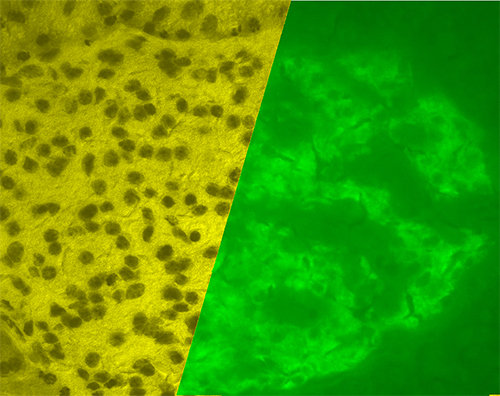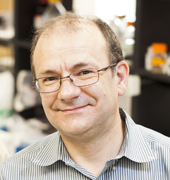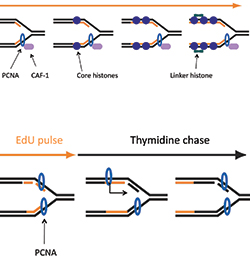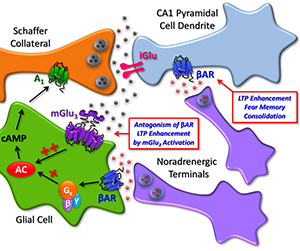Uncategorized
-

Shyr named chair of Department of Biostatistics
Yu Shyr, Ph.D., Harold L. Moses Professor of Cancer Research and director of the Vanderbilt Center for Quantitative Sciences, has been named chair of Vanderbilt’s Department of Biostatistics. He will assume the post Sept. 1. As the new chair, Shyr will spearhead a department recognized internationally for its research and educational… Read MoreJul. 27, 2017
-

Drivers of breast cancer metastasis
Overexpression of HER2 (human epidermal growth factor receptor 2) is found in about 25 percent of breast cancers and is associated with poor outcomes. HER2-amplified breast cancers use signaling through a complex of proteins called mTORC2 to drive tumor formation, tumor cell survival and resistance to HER2-targeted therapies. Rebecca Cook, Ph.D.,… Read MoreJul. 27, 2017
-

Investigators use light to kill microbial ‘vampires’
On July 24 Vanderbilt scientist Eric Skaar, Ph.D., MPH, summarized his group’s latest paper in a tweet: “If S. aureus is going to drink our blood like a vampire, let’s kill it with sunlight. That thing has been retweeted so many times,” said Skaar, the Ernest W. Goodpasture Professor of Pathology in the Vanderbilt University School… Read MoreJul. 27, 2017
-

Vanderbilt mourns loss of pharmacologist H. Alex Brown
H. Alex Brown, Ph.D., the Bixler-Johnson-Mayes Professor in the Department of Pharmacology at Vanderbilt University School of Medicine, died from cancer Tuesday, July 25, at his home. He was 56. Dr. Brown was a leader in the field of lipidomics, the application of analytical chemistry, mass spectrometry and systems biology to… Read MoreJul. 27, 2017
-

The β-Cell Response to the Challenge of Weaning
Embryonic development of the pancreas depends heavily on the Pdx1 transcription factor, which contributes to the differentiation and function of every cell type, including the insulin-secreting β-cells of the Islets of Langerhans. Expression of the gene encoding Pdx1 is controlled by four 5′-flanking enhancer-like domains designated Areas I, II, III,… Read MoreJul. 24, 2017
-

Study identifies protein’s role in chemotherapy resistance
Researchers at Vanderbilt University Medical Center (VUMC) have discovered a protein that may lead to a new way to prevent resistance and improve outcomes for patients whose cancers have mutations in the tumor suppressor gene BRCA2. In a paper published this week by the journal Molecular Cell, David Cortez, Ph.D., and colleagues describe how RADX regulates… Read MoreJul. 20, 2017
-

Immune responses linked to cell’s recycling system
Autophagy is the cellular equivalent of trash pickup and recycling — it is a process by which proteins, protein aggregates and damaged cellular organelles are degraded in order to reuse nutrients and promote cellular metabolism. Now researchers at Vanderbilt University Medical Center have found that autophagy also plays an important role… Read MoreJul. 20, 2017
-

RADX: A New DNA Replication and Repair Protein
Single-stranded DNA (ssDNA) binding proteins protect and promote the processing of ssDNA that is formed during replication and repair. Among these are RPA (replication protein A), which associates with ssDNA at the replication fork to facilitate lagging-strand synthesis and prevent fork collapse, and RAD51, which forms filaments on ssDNA at… Read MoreJul. 20, 2017
-

Understanding Myelination in the Peripheral Nervous System
The ability of the nervous system to transmit impulses rapidly depends on the presence of myelin, a complex membranous structure that provides insulation to neuronal axons. In the peripheral nervous system (PNS), myelin is formed by multiple Schwann cells, each of which wraps its membrane in a spiral fashion around… Read MoreJul. 19, 2017
-

Modulating the Formation of Stress-Related Memories
Synaptic plasticity – the ability of neurons to increase or decrease the strength of signal transmission in response to changes in synaptic activity – is a key process in learning, cognition, and memory. Considerable data suggest that noradrenergic neurons that project their axons to the cortex and hippocampus play a… Read MoreJul. 18, 2017